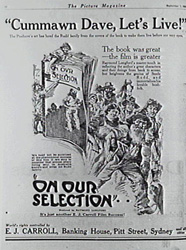
ON OUR SELECTION
Australia, 1920, 74 minutes, Black and white.
Percy Walshe, Tal Ordell, Beatrice Esmond, Carmen Coleman.
Directed by Raymond Longford.
On Our Selection is an early adaptation of Steele Rudd's popular stories about pioneering in the bush. It had been turned into a stage play in the '20s and was to be the basis of Ken Hall's series starring Bert Bailey as Dad: On Our Selection, Dad and Dave Come to Town, Grandad Rudd, Dad Rudd M.P. This film was directed by Raymond Longford who had made his mark in silent films. Longford's best known film is his adaptation of C. J. Dennis' Sentimental Bloke. Longford was to direct For The Term Of His Natural Life in the mid-'20s but the producers brought in American Norman Dawn. It marked the end of Longford's career. This film is somewhat primitive by later standards but it has a comic verve and vitality, a staging of scenes about the bush - but capturing some of the image and myth of the comic pioneers.
1. This film in the work of Raymond Longford and early silent film in Australia? The 'picturising' of the scenes? The exaggerated style of acting, the fixed camera and the limitations for performance? Sid Nicholls, comic strip writer and creator of Fatty Finn, and the humour and sentiment in his screenplay? The editing techniques and sense of continuity?
2. The popularity of Steele Rudd's stories? Insight into the bush and the pioneers of the 19th. century? Acknowledging the harsh realities but seeing the humorous and ironic side? Farcical side? The qualities of pioneering in the bush? The film's dedication to them?
3. The contribution of this kind of film to the mystique of the bush? The attitude towards the land, opening it up, the selections? The hardships for the pioneers, their dreams? Building homes after clearing the ground, the hard work, the crops, the horses and reliance on them, the droughts, the support of neighbours? Failures and success? How well were these captured in the film?
4. The entertainment of the comedy: the introduction to the various members of the family, their fighting and bickering? Dad as patriarchal? The girls in the family and their place in the household, at work? Fighting amongst each other? Joey and his mischief e.g. with the chimney? Dave and his dreams - Lily, his dancing practice etc.?
5. The serious undertones of the comic? The fact that all had to work to survive, the reliance on neighbours, all helping for success and the community spirit built up?
6. The visual presentation of the drought? Its repercussions? Hunger, borrowing flour etc.? The final rejoicing with the rain?
7. Kate and her work in the city, her return, her meeting Sandy? Meeting Sandy and the borrowing of the flour? The sing-song? Preparations for the wedding and the wedding ceremony?
8. The romance between Sarah and Bill? Bill's father and his hostility?
9. The romance between Dave and Lily? The young man and woman of the bush? Shy, awkward, comic? The family's poking fun at Dave? The wedding as the culmination of the film, of success, of future success in the bush communities?
10. The capturing of the 19th. century traditions on film? Their impact later in the 20th. century? Tribute to the achievement of the pioneers? The place of this film in the development of the Australian film industry?